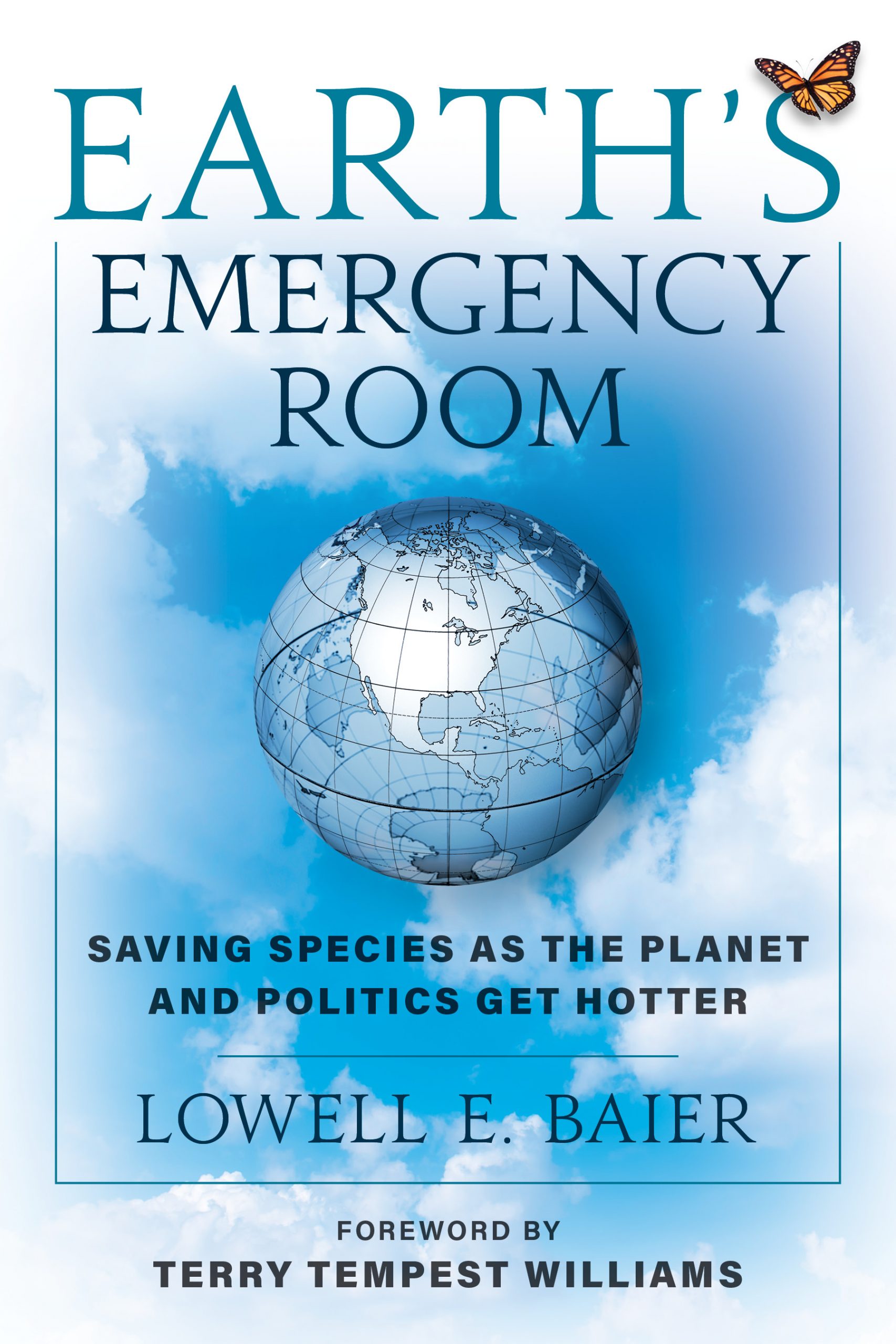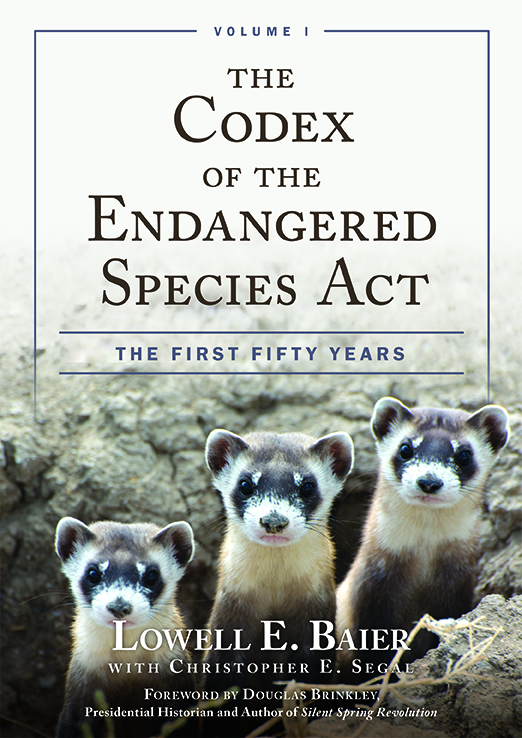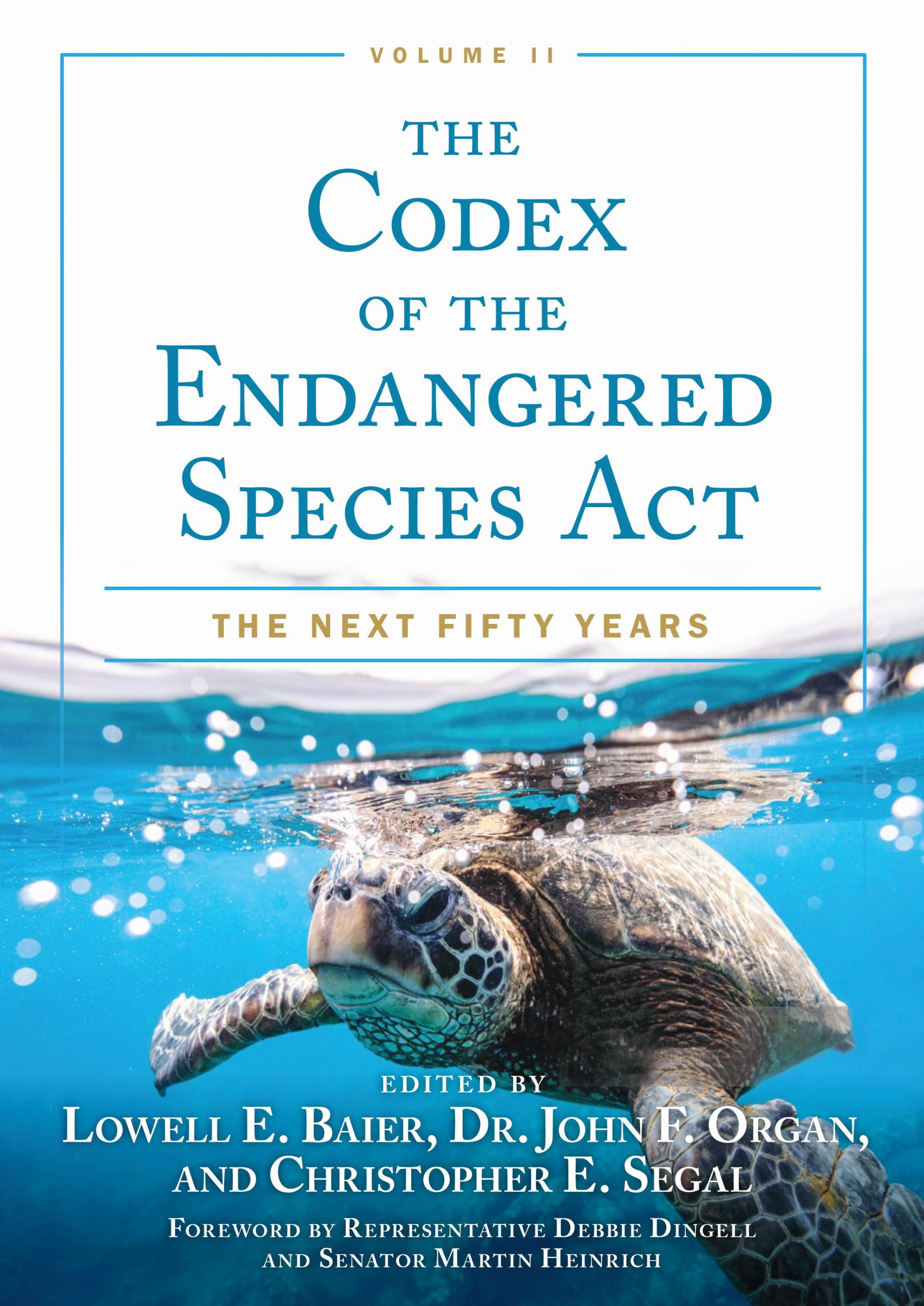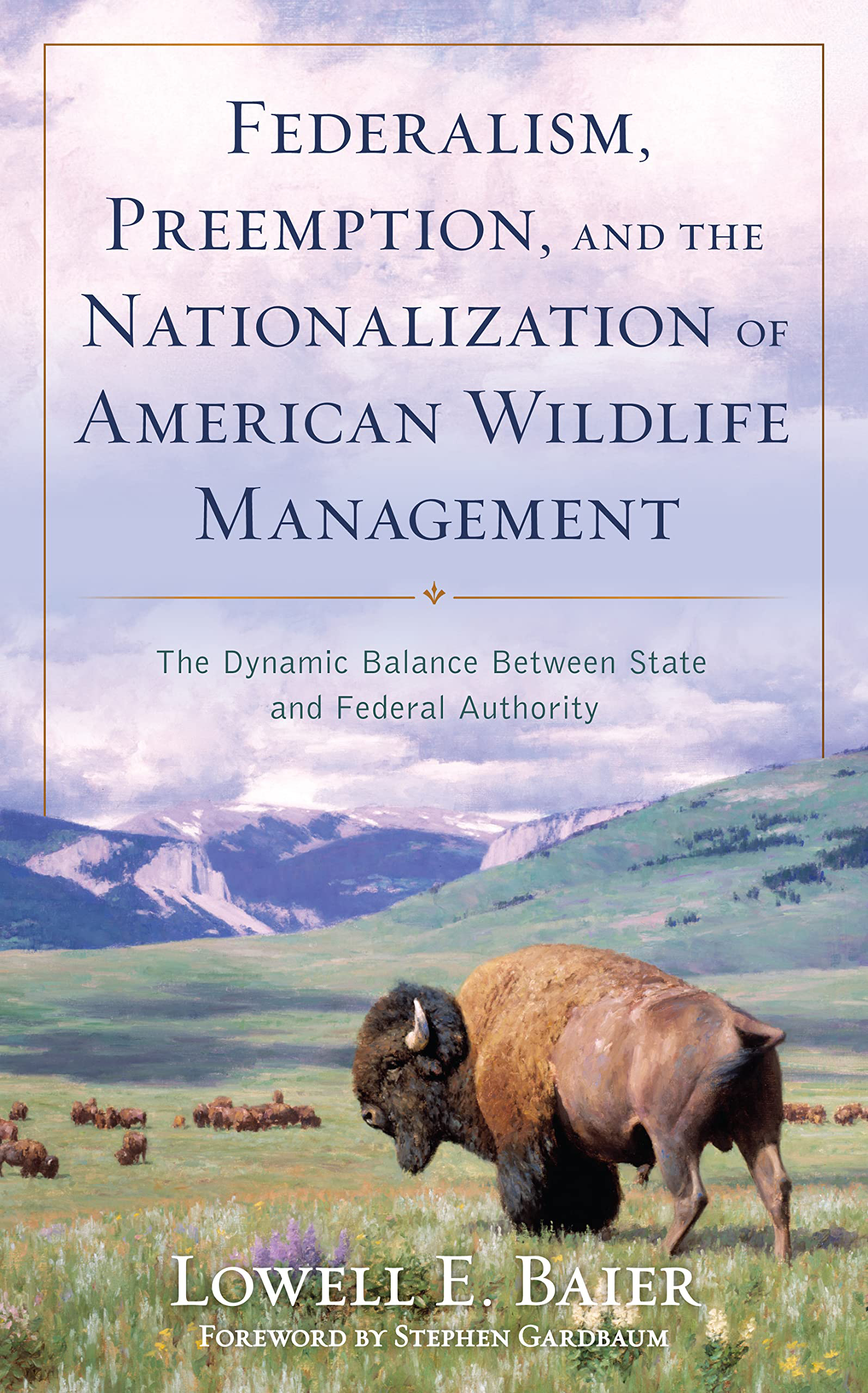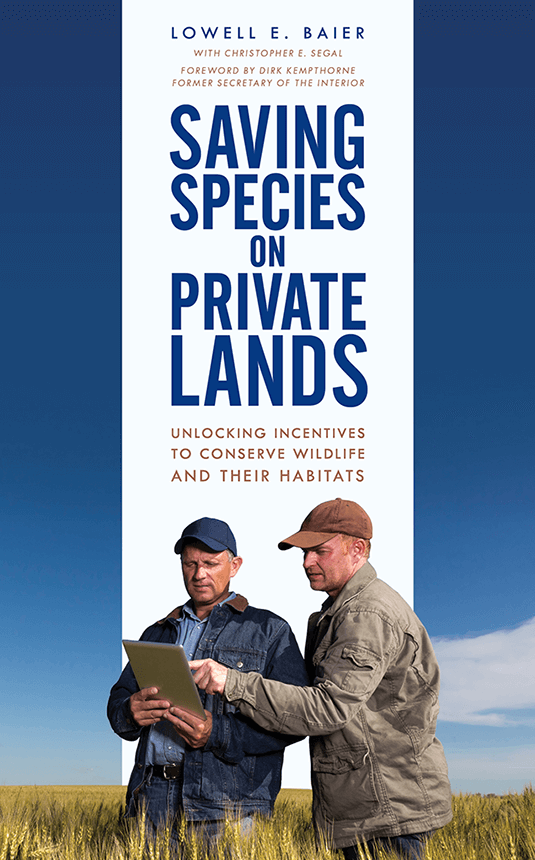Earth's Emergency Room — Saving Species as the Planet and Politics Get Hotter
By Lowell E. Baier
Earth’s Emergency Room: Saving Species as the Planet and Politics Get Hotter [Rowman & Littlefield; April 16, 2024] is a celebration of 50 years of the Endangered Species Act of 1973 (ESA). Author, attorney, and environmental historian Lowell Baier provides an insightful and entertaining history of the ESA’s dramatic highs and lows. He profiles his own work with the ESA from its inception to the present, and with the key figures who shaped its history, from field biologists to Presidents of the United States. Baier calls on all Americans to embrace a spirit of bipartisanship and conservation to strengthen the law that has been the Earth’s emergency room for half a century.
The ESA is one of our most cherished and reviled laws. It mandates protection and preservation of all the nation’s species and biodiversity, whatever the cost. It has been a lightning rod for controversy and conflicts between capitalism and conservation. Earth’s Emergency Room tells the story of this law over the last half-century through the experiences of author Lowell Baier. Living and working in the world of Washington, DC politics since 1956, Baier personally knew many of the people who shaped the postwar era. He explains their personalities and interests, his experiences with them, and their roles in creating, implementing, and defining the ESA.
The ESA has become highly controversial. Although it passed Congress with overwhelming support, species such as the black-footed ferret, snail darter, and northern spotted owl embroiled it in controversy. Recounting the stories of these species, Baier lets us into the real stories, human priorities, and personal relationships that shaped the law.
Much resistance to the ESA stems from its initial rigidity, which was a result of the command-and-control mentality of World War II. Much of the opposition to it today is based in the American West, where the legacy of the hardships of the frontier lingers in a strong sense of independence and suspicion of government.
Earth’s Emergency Room reflects on the differences between the era of the ESA (the 1960s and 70s) and today. Baier explains, “We have lost our national unity, bipartisan spirit, and clarity of purpose. In 1973 Congress made a moral pronouncement on behalf of the American people, that it was important to protect the Earth’s species. Today, we know that to be truer than ever, but we have lost our perspective. Only by recapturing the moral authority of the past, and acting as a united people, can we preserve the ESA and guarantee that it will continue to be an effective emergency room for the Earth’s imperiled species.”
The Codex of the Endangered Species Act, Volumes I: The First 50 Years
By Lowell E. Baier with Christopher E. Segal
The Endangered Species Act of 1973 (ESA) is one of the most cherished and reviled laws ever passed. It mandates protection and preservation of all the nation’s species and biodiversity, whatever the cost. It has been a lightning rod for controversy and conflicts between industry/business and environmentalists.
The year 2023 marks the 50th anniversary of the ESA. It is also another year in an ongoing crisis of biodiversity loss, species extinctions, climate change, and natural disasters. Conservationist, legal and environmental historian, author, and attorney Lowell E. Baier brings to life the stark choice that now faces America and the world: act to save our vanishing natural world or risk the consequences.
This is not a hopeless choice. Through a combination of original research spanning the history of American wildlife conservation, including the last 50 years of the ESA and earlier; new research and bold proposals for the future of the ESA; and a year-long series of events, Baier is joined by over two dozen ESA scholars, practitioners, and policy experts with a bold vision for the future of the ESA and wildlife conservation in America.
Volume I: The First Fifty Years
By Lowell E. Baier with Christopher E. Segal
This is the first comprehensive, single-volume history of the Endangered Species Act of 1973. It covers the entire history of the law, including how it arose as a response to the environmental movement of the 1960s-70s and the threat of species extinction, and represented both a continuation of and a break from the tradition of wildlife conservation pioneered by sportsmen and state fish and wildlife agencies. The history of the ESA since 1973 is traced in a historiographic manner, including the major legislative, judicial, and administrative events around the law, together with the economic and societal influence of each era. Analysis of contemporary challenges such as funding, collaboration, state-federal relations, species delisting, and the biodiversity crisis known as the “sixth great extinction” are all included, making this book a complete reference for any student, legislator, policy analyst, program administrator, landowner, or member of the public who wants to know about the ESA and be prepared for the next 50 years.
AWARDS
Volume I
2024 Independent Press Award Winner in the category of Environment
2024 Independent Press Award Winner in the category of History: United States
The Codex of the Endangered Species Act, Volumes II: The Next 50 Years
Volume II: The Next Fifty Years
Edited by Lowell E. Baier, John F. Organ, and Christopher E. Segal
Just as the ESA has had a long and successful history, it also has a bright future. In this volume, over twenty-five expert authors, including ESA practitioners, scholars, and policy experts, come together to prescribe a future path for a more effective, and less controversial, ESA. Their recommendations span the spectrum of available tools: legislative, regulatory, administrative, and voluntary.There is something for everyone in this book: if the ESA affects you, there is something that you, or your partners in the government, commerce and industry, and nonprofit communities, can do to resolve conflicts, complete objectives, and conserve wildlife.
The book explains the latest science and innovations in wildlife conservation, including in habitat management, species genetics, land use planning, and more. It brings to life the human element, drawing on the fields of human dimensions science, conflict-resolution, and collaborative conservation. It is a reference book for scientists, administrators, practitioners, Congress, and future presidential administrations to rely on going forward, providing a road map for the application of the Endangered Species Act over the next 50 years.”
AWARDS
Volume II
2024 Independent Press Award Winner in the category of Nature
2024 Independent Press Award Winner in the category of Environment
Federalism, Preemption, and the Nationalization of American Wildlife Management: The Dynamic Balance Between State and Federal Authority
By Lowell Baier | March 30, 2022
Environmental law expert Lowell E. Baier reveals how over centuries the federal government slowly preempted the states’ authority over managing their resident wildlife. Wildlife management today has become fraught with tension over the appropriate roles for federal, state, and private actors, who should be responsible for conservation, and how it should be funded. The book places these conflicts in their appropriate historiographic contexts, showing how they glacially emerged over time, and how the legislative, executive, and judicial branches of our government all contributed to the growing problem.
The book offers solutions as well, exploring how increased funding, partnerships rather than partisanship, and a renewed commitment to our federalist tradition offer the promise of a more secure future for our wildlife, and ourselves.
In this essential volume, Baier educates elected officials, wildlife students, and environmentalists in both the precedents that led to the current state of wildlife management, and how a constructive and collaborative environment can be fostered at all levels of government to improve our nation’s wildlife and biodiversity.
AWARDS
Winner, 2023 Independent Press Award in the Environment Category
Winner, 2023 Independent Press Award in the History: United States Category
Winner, 2023 National Indie Excellence Award in the History: United States Category
Winner, 2022 New York City Big Book Award in the Environment Category
Winner, 2022 New York City Big Book Award in the Political Category
Silver Medal, 2022 Global Book Awards in the Environmental Category
Silver Medal, 2022 Global Book Awards in the History Category
Bronze Medal, 2023 Independent Publisher (IPPY) Book Awards in the Environment/Ecology Category
Short List, 2023 Eric Hoffer Book Award Grand Prize
1st Runner-Up, 2023 Eric Hoffer Book Award in the E-Book Nonfiction Category
Finalist, 2022 Forward Indies Book Award in the Ecology & Environment Category
FInalist, 2022 Next Generation Indie Book Awards in the Science/Nature/Environment Category
Finalist, 2022 Next Generation Indie Book Awards in the Historical Non-Fiction Category
Saving Species on Private Lands: Unlocking Incentives to Conserve Wildlife and Their Habitats
By Lowell E. Baier with Christopher E. Segal | March 10, 2020
In this practical handbook, Lowell E. Baier explores the best hope for successful conservation of America’s threatened, endangered, and at-risk wildlife – voluntary, cooperative partnerships that focus on private land, where over 75% of at-risk species can be found. Private landowners form the bedrock of these partnerships, and they have a long history of rising to meet the challenge of conservation. But they can’t do it alone.
This book is a guide for private landowners who want to conserve wildlife. Whether engaged in farming, ranching, forestry, mining, energy development, or another business, private working lands all have value as wildlife habitat, with the proper management and financial support. This book provides landowners and their partners with a roadmap to achieve conservation compatible with their financial and personal goals.
The book introduces the art and language of land management planning as well as regulatory compliance with laws such as the Endangered Species Act of 1973. It categorizes and explains the tools used by wildlife professionals to implement conservation on private lands. Moreover, it documents the multitude of federal, state, local, and private opportunities for landowners to find financial and technical assistance in managing wildlife, from working with a local NGO to accessing the nearly $6 billion per year available through the federal Farm Bill.
AWARDS
Short List, 2021 The Wildlife Society Annual Publication Award (One of five books so recognized)
Winner, 2021 New York City Big Book Award in the Nature category
Winner, 2021 Eric Hoffer Book Award in the Business category
Winner, 2021 Independent Press Book Award in the Green/Conservation category
Winner, 2020 Next Generation INDIE Book Awards, Best Non-Fiction E-book
Short List, 2021 Eric Hoffer Book Award Grand Prize
Finalist, 2021 Eric Hoffer Book Award Montaigne Medal
Finalist, 2020 Next Generation INDIE Book Awards in the Nature/Environment category
Finalist, Forest History Society Charles A. Weyerhaeuser Book Award
Silver Medal, 2021 Independent Publisher Book Award in the Reference category
Inside the Equal Access to Justice Act: Environmental Litigation and the Crippling Battle over America's Lands, Endangered Species, and Critical Habitats
By Lowell E. Baier | March 17, 2020
In this book, Lowell Baier, one of America’s preeminent experts on environmental litigation, chronicles the century-long story of American natural resources management, focusing on litigation, citizen suits, and attorneys’ fees. He provides the first book-length comprehensive examination of the little-known 1980 Equal Access to Justice Act (EAJA), and its role in environmental litigation. Originally intended to support veterans, the disabled, and small businesses, EAJA, Baier argues, now paralyzes America’s public land management agencies. Baier introduces readers to the history of EAJA, examines the many beneficiaries of the law, describes in depth 20 of the most prominent litigious environmental groups in America, and recommends carefully tailored amendments to EAJA to correct environmental abuses of the law while protecting legitimate interests.
In 2019, at the urging of Baier and with his book and Congressional testimony as evidence, Congress responded by passing the John D. Dingell, Jr. Conservation, Management, and Recreation Act, which included an amendment to the Equal Access to Justice Act that has brought transparency to the law and restored part of the original intent of Congress to the law. Inside the Equal Access to Justice Act is a valuable resource for the environmental legal community, environmentalists, practitioners at all levels of government, and all readers interested in environmental policy and the modern administrative state.
AWARDS
Winner, 2017 Next Generation INDIE Book Awards Grand Prize for Best Non-Fiction Book
Winner, 2017 Next Generation INDIE Book Awards in the Science/Nature/Environment category
Finalist, Forest History Society Charles A. Weyerhaeuser Book Award
Finalist, 2016 Foreword Reviews IndieFab Book of the Year in the Ecology/Environment Category
Finalist, 2016 Foreword Reviews IndieFab Book of the Year in the History Category

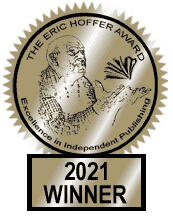 Saving Species on Private Lands: Unlocking Incentives to Conserve Wildlife and Their Habitats was recently recognized by the Eric Hoffer Award. The book was named the winner of the Business category and a finalist for the Eric Hoffer Award’s Grand Prize and for the Montaigne Medal, which is awarded to the most thought-provoking book.
Saving Species on Private Lands: Unlocking Incentives to Conserve Wildlife and Their Habitats was recently recognized by the Eric Hoffer Award. The book was named the winner of the Business category and a finalist for the Eric Hoffer Award’s Grand Prize and for the Montaigne Medal, which is awarded to the most thought-provoking book.
 Saving Species on Private Lands: Unlocking Incentives to Conserve Wildlife and Their Habitats was recently recognized by the Independent Press Award. The book, which is a guide for private landowners who want to conserve fish and wildlife on their lands, was named the 2021 winner of the Conservation/Green category.
Saving Species on Private Lands: Unlocking Incentives to Conserve Wildlife and Their Habitats was recently recognized by the Independent Press Award. The book, which is a guide for private landowners who want to conserve fish and wildlife on their lands, was named the 2021 winner of the Conservation/Green category.
 Saving Species on Private Lands: Unlocking Incentives to Conserve Wildlife and Their Habitats was recently named a 2020 Next Generation Indie Book Award winner by the Independent Book Publishing Professionals Group, taking home a win in the E-Book (Non Fiction) category and named a finalist for best book in the Nature/Environment category.
Saving Species on Private Lands: Unlocking Incentives to Conserve Wildlife and Their Habitats was recently named a 2020 Next Generation Indie Book Award winner by the Independent Book Publishing Professionals Group, taking home a win in the E-Book (Non Fiction) category and named a finalist for best book in the Nature/Environment category.
 Federalism, Preemption, and the Nationalization of American Wildlife Management: The Dynamic Balance Between State and Federal Authority was recently named a 2022 NYC Big Book Award winner in the Environment category.
Federalism, Preemption, and the Nationalization of American Wildlife Management: The Dynamic Balance Between State and Federal Authority was recently named a 2022 NYC Big Book Award winner in the Environment category.

The Codex of the Endangered Species Act Volume I and II were recently named a 2024 Independent Press Award Winner in Environment, Nature, and History: U.S. Categories.
